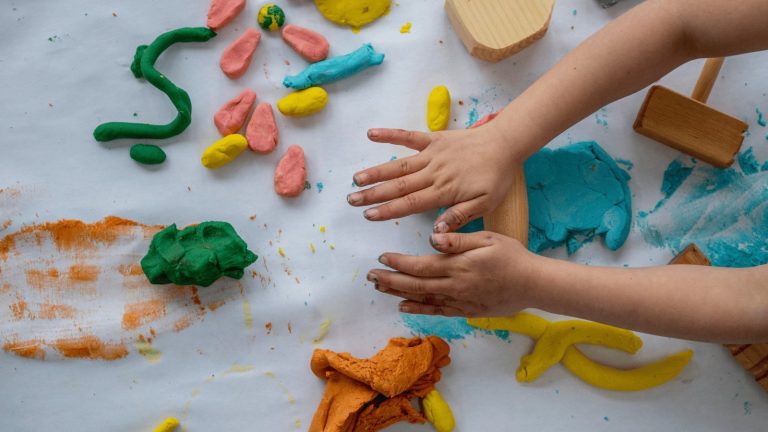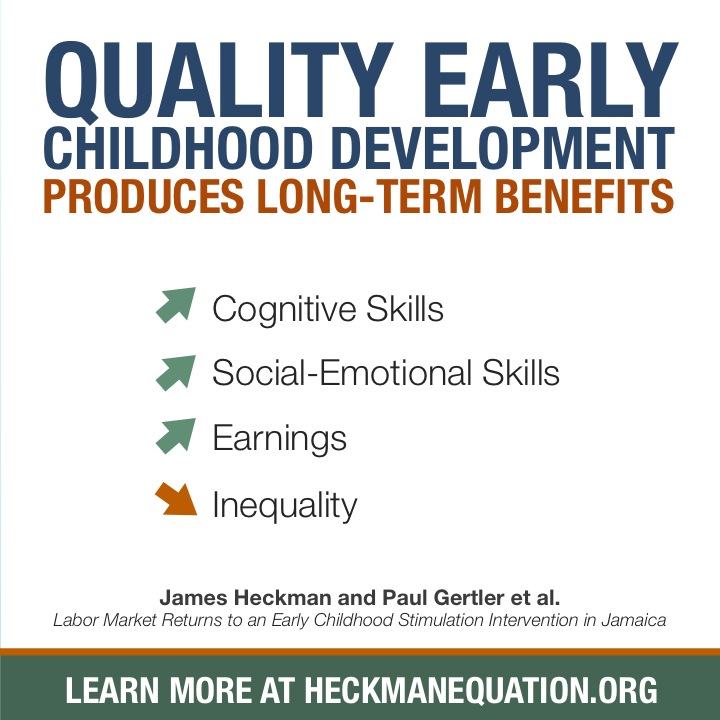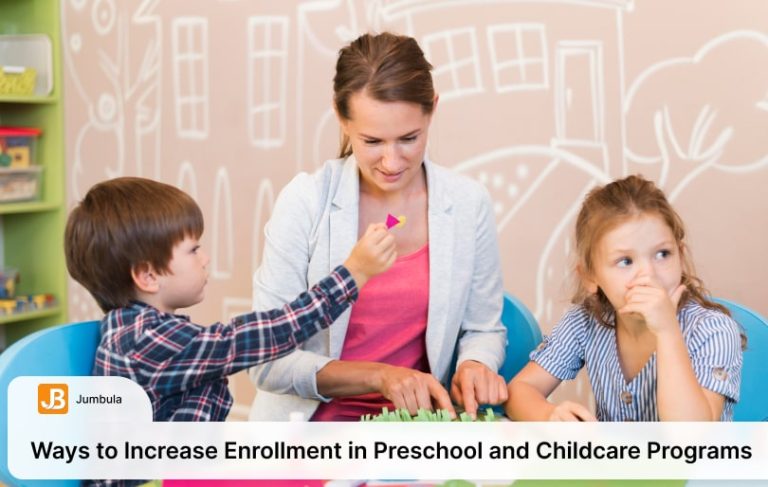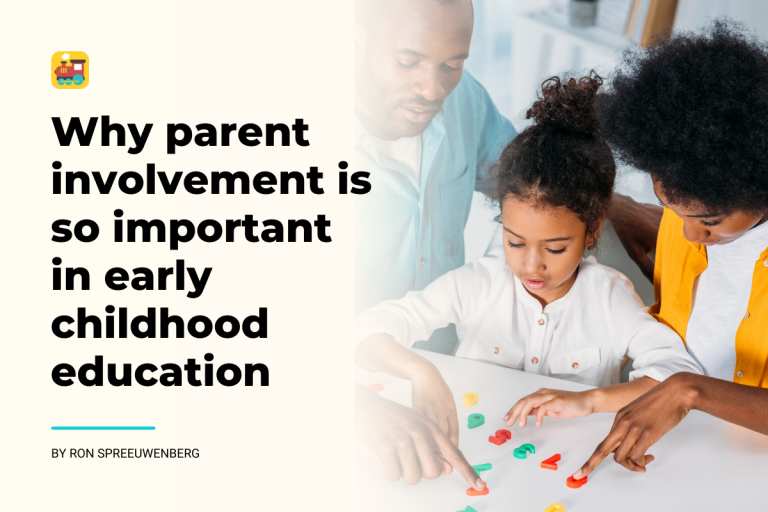What Every Parent Should Know: The 12 Core Early Childhood Education Units
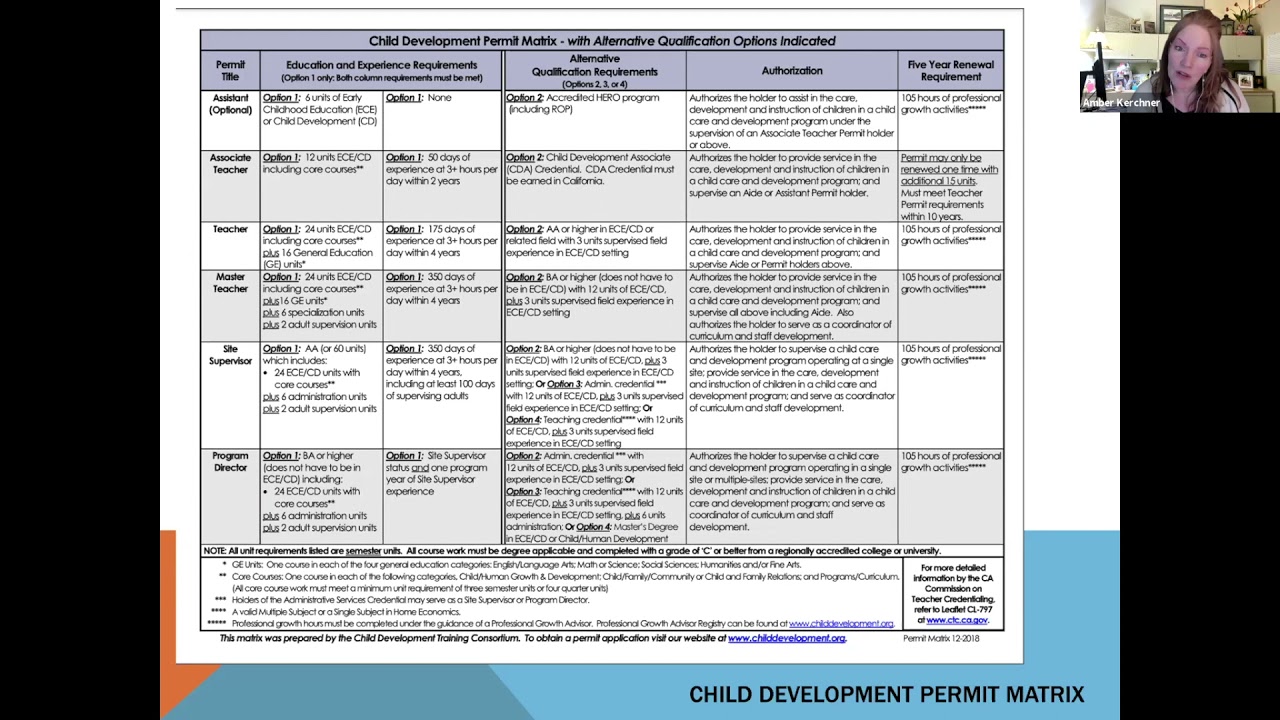
The 12 core Early Childhood Education units cover child development, curriculum planning, and teaching strategies. These units are essential for aspiring educators to build a strong foundation in the field.
Early Childhood Education is a crucial stage in a child’s development, requiring specialized knowledge and skills. The 12 core units provide a comprehensive understanding of how young children learn and grow, equipping educators with the tools to create engaging and effective learning environments.
From understanding child development theories to implementing diverse teaching strategies, these units cover a wide range of topics essential for providing quality early childhood education. By mastering these core units, educators can make a positive impact on the lives of young learners and contribute to their overall well-being and development.
Unit 1: Child Development
Unit 1: Child Development is a crucial part of early childhood education. Understanding the various aspects of child development is essential for educators and caregivers to provide a nurturing and supportive environment for young children. This unit explores the physical and cognitive development of children, laying the foundation for their overall growth and well-being.
Physical Development
Physical development in early childhood education refers to the growth and maturation of a child’s body, muscles, and motor skills. It encompasses their gross motor skills, such as walking and running, as well as fine motor skills, including hand-eye coordination and manipulation of objects. The physical development of children is essential for their overall health and ability to engage in various activities.
Cognitive Development
Cognitive development focuses on a child’s mental processes, including their ability to think, learn, and solve problems. This aspect of child development encompasses language development, memory, attention, and reasoning skills. Understanding cognitive development is vital for early childhood educators as it forms the basis for implementing age-appropriate learning activities and fostering intellectual growth in children.

Credit: slideplayer.com
Unit 2: Language Development
Unit 2: Language Development in early childhood education plays a crucial role in a child’s overall cognitive, social, and emotional development. This unit focuses on fostering the development of speech and communication skills as well as literacy development. By providing a strong foundation in language, children are better equipped to express themselves, comprehend the world around them, and become successful learners.
Speech And Communication Skills
Speech and communication skills are essential components of language development. Through interaction with caregivers, educators, and peers, children begin to develop their vocabulary, articulation, and expressive language abilities. Encouraging children to engage in conversations, express their thoughts, and actively listen to others helps in honing their communication skills. Additionally, activities such as storytelling, role-playing, and group discussions can further enhance their verbal abilities.
Literacy Development
Literacy development encompasses the skills and knowledge that children need to read and write effectively. In early childhood education, it involves exposing children to books, stories, and various forms of print. Through activities like reading aloud, identifying letters and sounds, and engaging in pre-writing exercises, educators can support children’s emergent literacy skills. By creating a language-rich environment, children can develop a love for reading and writing, laying the foundation for future academic success.
Unit 3: Social And Emotional Development
Unit 3: Social and Emotional Development is a crucial component of early childhood education, focusing on nurturing children’s emotional intelligence, empathy, and social skills. This unit plays a fundamental role in laying the foundation for a child’s well-being and success in future relationships and academic pursuits.
Building Relationships
Developing strong and healthy relationships is essential for a child’s overall development. Encouraging positive interactions with peers and adults helps children cultivate trust, empathy, and cooperation. Through guided activities and play, children learn to communicate effectively, resolve conflicts, and build meaningful connections.
Emotional Regulation
Teaching children how to manage their emotions and cope with stress is a vital aspect of early childhood education. Providing tools and strategies for emotional regulation empowers children to express themselves appropriately and navigate challenging situations with resilience. Through activities that promote self-awareness and mindfulness, children learn to recognize and regulate their emotions in a healthy manner.

Credit: socialsci.libretexts.org
Unit 4: Play-based Learning
Unit 4: Play-Based Learning is a crucial component of early childhood education that focuses on providing children with opportunities to learn through play. Play-based learning is a child-centered approach that encourages exploration, creativity, and problem-solving skills. It allows children to engage in activities that are enjoyable and meaningful, while also promoting their cognitive, social, and emotional development.
Benefits Of Play
Play offers a wide array of benefits for young children, including:
- Enhanced cognitive development
- Improved language skills
- Development of social and emotional skills
- Opportunities for creativity and imagination
- Strengthening of problem-solving abilities
Types Of Play
Play can take various forms, such as:
- Pretend play: Role-playing and imaginative scenarios
- Physical play: Running, jumping, and climbing
- Constructive play: Building with blocks or other materials
- Social play: Interacting with peers and adults
- Symbolic play: Using objects to represent something else
Unit 5: Early Math Skills
Unit 5 in early childhood education focuses on Early Math Skills, essential for a child’s cognitive development.
Number Sense
Understanding numbers is crucial for young children. Number Sense helps them grasp quantities and relate them to real-world scenarios.
Shapes And Patterns
Learning about Shapes and Patterns lays the foundation for mathematical thinking. Children explore geometric shapes and identify patterns in their environment.
Unit 6: Science Exploration
Unit 6 in Early Childhood Education curriculum focuses on Science Exploration, one of the 12 Core Units. Children engage in hands-on activities to foster curiosity and understanding of scientific concepts. This unit encourages critical thinking and exploration in young learners.
Early childhood education is crucial for the overall development of children. The 12 core units of early childhood education are designed to provide children with an all-encompassing education. One such unit is Unit 6: Science Exploration. This unit is designed to introduce children to the world of science and inspire them to explore and learn about the world around them.Nature Studies
Nature studies are an essential part of science exploration. Children get to explore the world of plants, animals, and insects. They learn about the different habitats, climates, and ecosystems. Teachers can take children on nature walks and encourage them to observe and ask questions. This helps children to develop their scientific inquiry skills and fosters a lifelong love for nature.Simple Experiments
Simple experiments are a fun and engaging way to teach children about science. Children get to explore different scientific concepts such as gravity, magnetism, and density. Teachers can demonstrate simple experiments like mixing baking soda and vinegar to create a chemical reaction or making a simple circuit with a battery and a light bulb. These activities help children to develop their problem-solving skills and promote a love for science.Here are some examples of simple experiments:
| Experiment | Materials Needed |
|---|---|
| Balloon Rocket | Balloon, string, straw, tape |
| Magnetic Slime | Iron oxide powder, glue, water, liquid starch |
| Egg in a Bottle | Boiled egg, bottle, matches |
Tips for conducting simple experiments:
- Always conduct experiments under adult supervision
- Use age-appropriate materials and equipment
- Encourage children to make observations and ask questions
- Discuss the results of the experiment with the children
Unit 7: Art And Creativity
Unit 7: Art and Creativity is an essential component of early childhood education, fostering imagination, self-expression, and cognitive development. This unit focuses on providing children with diverse opportunities to explore and engage in various forms of art, allowing them to express themselves creatively and develop their fine motor skills.
Expressive Arts
Art activities such as painting, drawing, sculpting, and collage allow children to communicate their emotions, thoughts, and experiences. Through these activities, children can express themselves in a non-verbal manner, fostering creativity and enhancing their ability to communicate and connect with others.
Sensory Activities
Sensory activities within the context of art and creativity involve exploring different textures, colors, and materials. Engaging in sensory experiences helps children develop their senses and cognitive skills while also enhancing their ability to appreciate and engage with the world around them.
Unit 8: Music And Movement
Rhythmic Activities
Engaging children in rhythmic activities promotes coordination and creativity.
Dance And Movement Games
Encouraging dance and movement games helps develop motor skills and self-expression.
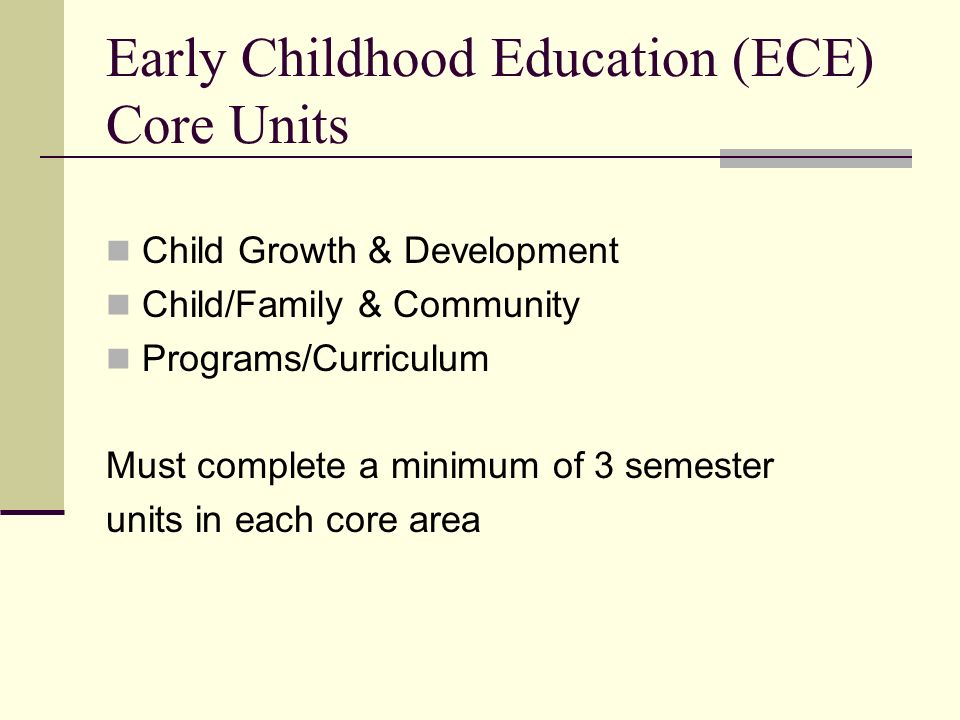
Credit: slideplayer.com
Frequently Asked Questions
What Is 12 Core Ece Units In California?
In California, 12 core ECE units are required for early childhood education certification.
How Many Ece Units Do Preschool Teachers Need In California?
Preschool teachers in California need a minimum of 12 ECE units for employment.
What Do Ece Units Mean?
ECE units refer to Early Childhood Education units, which are courses focusing on young children’s development and learning. These units are typically required for individuals pursuing a career in early childhood education or related fields.
What Is A Core Concept Of Early Childhood Education?
The core concept of early childhood education is to provide a nurturing and stimulating environment for young children to develop their cognitive, social, emotional, and physical skills. It involves fostering curiosity, creativity, and a love for learning through play-based activities and hands-on experiences.
This approach emphasizes the importance of early education in setting a foundation for future academic and personal success.
Conclusion
Early childhood education units play a vital role in shaping young minds. By focusing on key areas such as language development, social skills, and cognitive growth, these units provide a strong foundation for lifelong learning. Investing in quality early education sets children up for success in school and beyond.
Prioritizing these core units ensures a bright future for our youngest learners.
Lorem Ipsum is simply dummy text of the printing and typesetting industry. Lorem Ipsum has been the industry’s standard dummy text ever since the 1500s, when an unknown printer took a galley of type and scrambled it to make a type specimen book.


